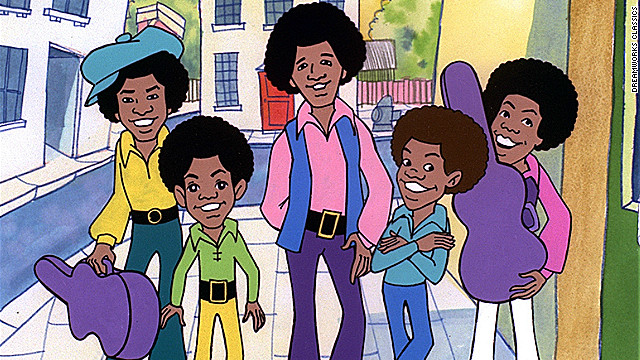
- "Jackson 5ive" cartoon fictionally chronicled the brothers' success
- The series featured songs like "ABC," "I Want You Back," "I'll Be There"
- Animation director Bob Balser co-directed the Beatles' "Yellow Submarine"
- Balser tried to inject "European flavor" into a "Hollywood production"
(CNN) -- Ready to jive, cool cats? Let's slide!
"Jackson 5ive" ran as part of ABC's Saturday morning cartoon lineup beginning in September 1971. A heavily fictionalized representation of the Jackson 5's rise to fame and subsequent success, it was co-produced by Rankin/Bass (of Christmas special fame) and Motown Records.
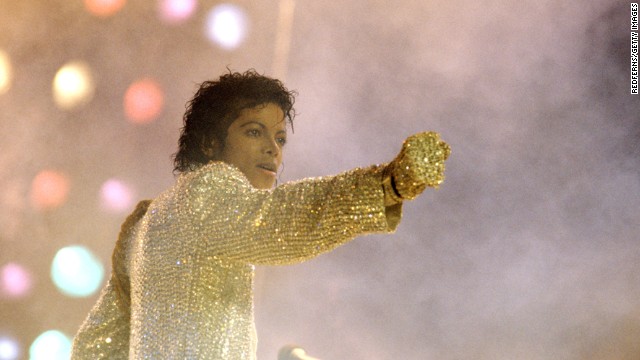 The death in 2009 of superstar Michael Jackson, who died of cardiac arrest at the age of 50, sent shockwaves around the world.
The death in 2009 of superstar Michael Jackson, who died of cardiac arrest at the age of 50, sent shockwaves around the world.
 Jackson's death caused an outpouring of grief from fans. Here, a fan places flowers at a makeshift memorial outside the Jackson family compound in Encino, California, the day after his death.
Jackson's death caused an outpouring of grief from fans. Here, a fan places flowers at a makeshift memorial outside the Jackson family compound in Encino, California, the day after his death.
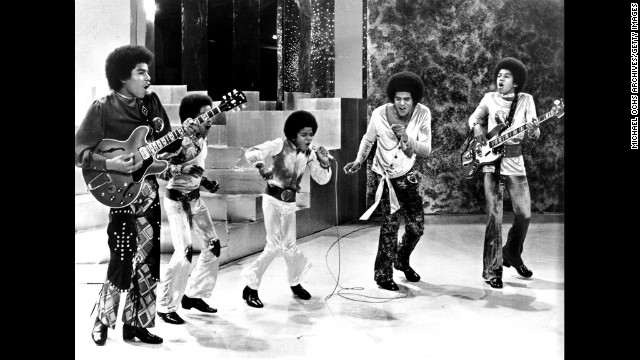 The Jackson 5 perform on a TV show circa 1969. From left, Tito Jackson, Marlon Jackson, Michael Jackson, Jackie Jackson and Jermaine Jackson.
The Jackson 5 perform on a TV show circa 1969. From left, Tito Jackson, Marlon Jackson, Michael Jackson, Jackie Jackson and Jermaine Jackson.
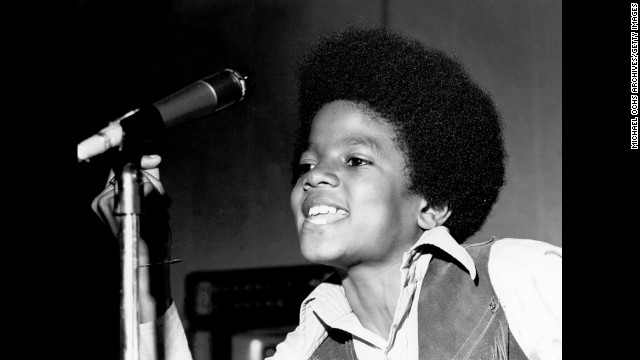 Michael Jackson quickly became the stand out star of the Jackson 5. Here he performs onstage circa 1970.
Michael Jackson quickly became the stand out star of the Jackson 5. Here he performs onstage circa 1970.
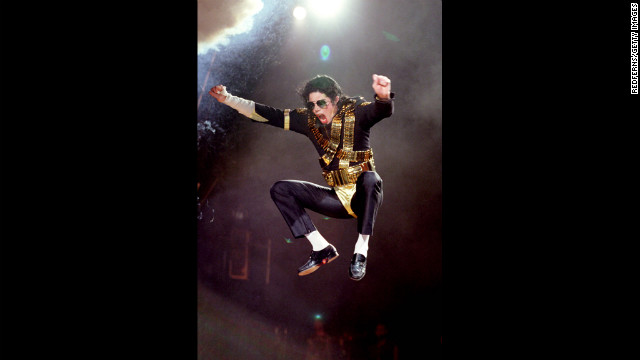 Known for his dance moves, Jackson is seen here jumping in the air while performing during the Dangerous tour in 1992.
Known for his dance moves, Jackson is seen here jumping in the air while performing during the Dangerous tour in 1992.
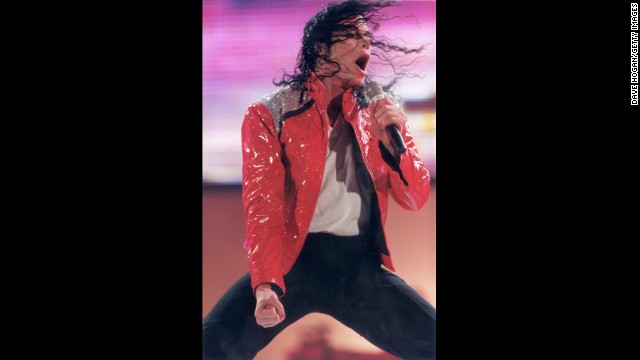 Jackson broke a world record during the Bad tour in 1988 when 504,000 people attending seven sold-out shows at Wembley Stadium in London.
Jackson broke a world record during the Bad tour in 1988 when 504,000 people attending seven sold-out shows at Wembley Stadium in London.
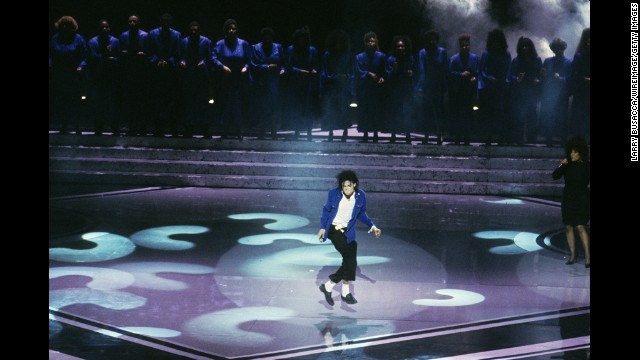 Jackson perfoms in concert circa 1991 in New York City.
Jackson perfoms in concert circa 1991 in New York City.
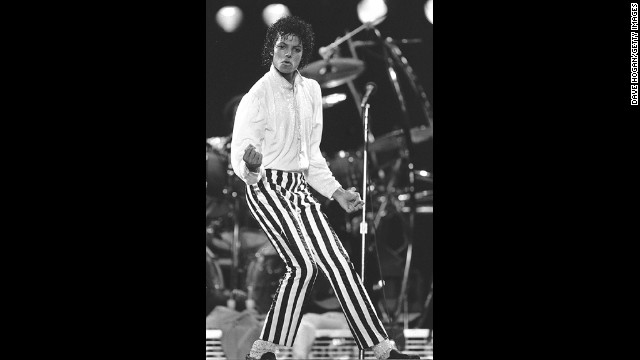 Jackson achieved superstardom with his solo career in the 1980s. Here Jackson is shown on stage in Kansas in 1983.
Jackson achieved superstardom with his solo career in the 1980s. Here Jackson is shown on stage in Kansas in 1983.
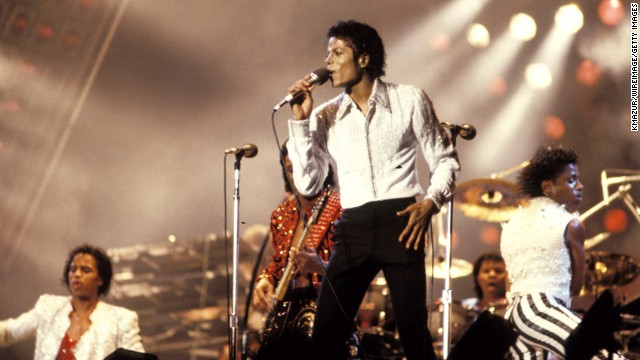 Michael Jackson performs on stage circa 1990.
Michael Jackson performs on stage circa 1990.
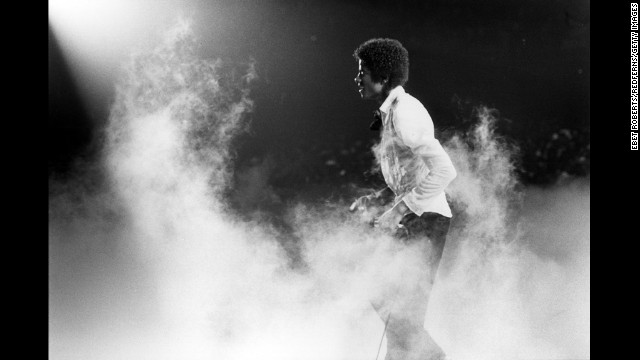 Michael Jackson performs with The Jacksons in New Orleans on October 3, 1979.
Michael Jackson performs with The Jacksons in New Orleans on October 3, 1979.
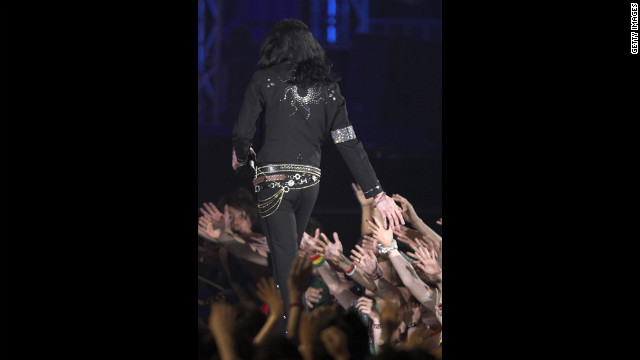 Michael Jackson earned the Legend Award during the MTV Video Music Awards in Tokyo in 2006.
Michael Jackson earned the Legend Award during the MTV Video Music Awards in Tokyo in 2006.
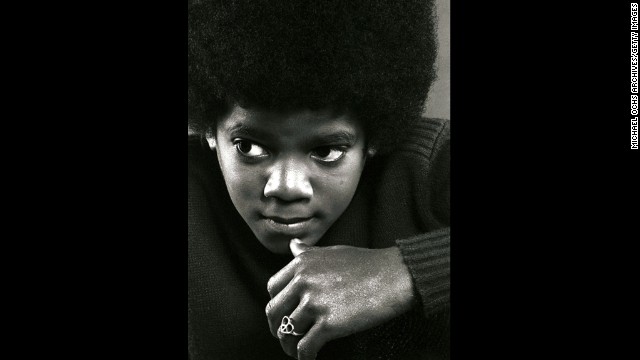 Michael Jackson poses during a portrait session in Los Angeles in 1971.
Michael Jackson poses during a portrait session in Los Angeles in 1971.
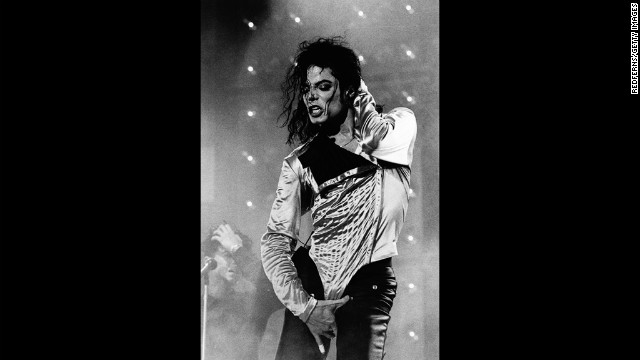 Michael Jackson performs in Rotterdam, Netherlands.
Michael Jackson performs in Rotterdam, Netherlands.
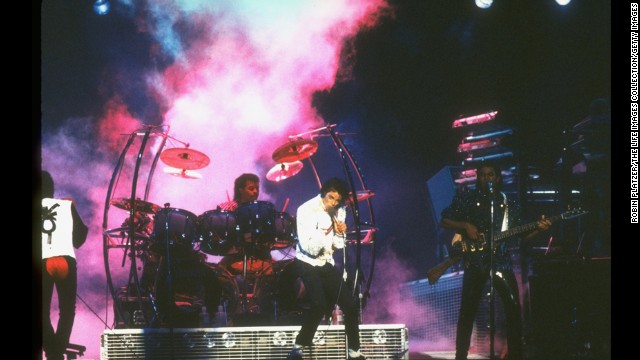 Jackson performs with his brothers.
Jackson performs with his brothers.
 Jackson performs during the Bad tour at Wembley Stadium in London.
Jackson performs during the Bad tour at Wembley Stadium in London.
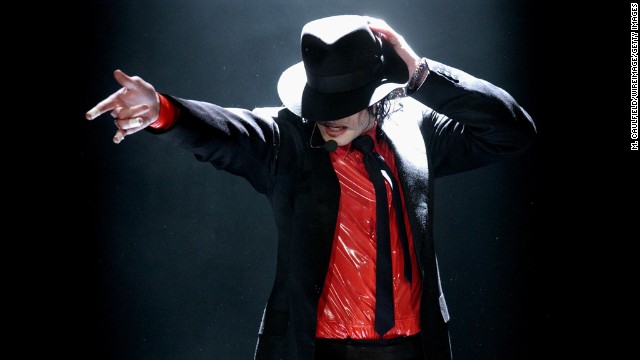 Jackson performs during the taping of "American Bandstand's 50th: A Celebration" in 2002.
Jackson performs during the taping of "American Bandstand's 50th: A Celebration" in 2002.
 Photos: Michael Jackson, King of Pop
Photos: Michael Jackson, King of Pop
A relic replete with bell bottoms, tie dyed shirts and reel-to-reel tape players, the series has been released on DVD/Blu-ray by DreamWorks Classics.
Every episode featured two musical numbers by the cartoon counterparts of Jackie, Tito, Jermaine, Marlon and Michael Jackson. The songs -- Jackson 5 staples like "ABC," "The Love You Save," and "I'll Be There" -- were woven in to the plotlines of the show, which experienced a renaissance in 1984 with Michael Jackson's rising solo career. Although the show didn't feature the speaking voices of the Jacksons because of scheduling conflicts, it was them singing.
"Jackson 5ive" animation director Bob Balser had co-directed the Beatles' "Yellow Submarine" film and developed the reputation as an expert in music videos.
Balser said his most important contribution to "Jackson 5ive" was his insistence that the series not include violence. He was also adamant that the show -- one of the first cartoon representations of a black family --- be fair and not resort to cheap gags and stereotyping.
"When I came in," explained Balser, "the series had been started. I was not happy with the approach they were doing because ... (this) was going to be the first series directed at young people that was about a black group, and I felt that it was really important that it be shown in a creative way, that they solved their problems with music and with intelligence and not with violence -- which had started out as the approach in the first episode."
Balser, now 85, attended art school at UCLA. After graduation, he traveled to Europe for what was supposed to be a six-month vacation. He wound up living and working there for 40 years, spending a decade in London, where he worked on "Yellow Submarine" and "Jackson 5ive," among other projects. He then ran a studio out of Barcelona for 30 years.
"There was a lot of influence from the stuff that we did in 'Yellow Submarine' in terms of interpreting songs in a creative, graphic way," said Balser. "It was a Hollywood production done in London, and I brought in as much of a European flavor as I could."
Balser commissioned studios throughout Europe to work on the two songs featured in each episode.
"I got the best artists I could get and gave them complete freedom," explained Balser. "I said, for example, 'This is a circus theme, so the graphics have to reflect that theme.' Other than that, they were completely free to do it however they wanted. We came up with some fun stuff, which was really one of the best parts and that was probably one of the things that made the 'Jackson 5ive' series so popular in terms of the reception that it received."
Most episodes featured the Jacksons driving around in their charmingly dilapidated jalopy -- with pet mice Ray and Charles and pink snake Rosie -- trying to please their manager, a cartoon version of Motown founder Berry Gordy. Gordy was never really the Jackson 5's manager, per se, but in the cartoon universe it worked, with him coming up with ideas for publicity.
In one episode, the Jackson brothers take a plane -- with their jalopy tied to the aircraft -- to a concert similar to Woodstock and are pitted against evil lumberjacks planning to tear down the outdoor show's forest venue.
In another, Marlon and Michael are accidentally drafted into the military and get their afros shaved off. In yet another episode, Michael is adopted by a female gorilla.
Another strange theme was that a disproportionate number of episodes featured young Michael Jackson falling unconscious:
• On a flight to Hawaii, the five brothers crash onto an desert island. Michael gets hit in the head with a coconut and encounters a band of pirates.
• In the episode titled "Michael White," the future King of Pop hits his head in a bicycling accident and dreams that he is a hiding in a cottage where his brothers have become dwarf-sized, like in the story of Snow White. Michael bites a poison apple and immediately collapses.
• In "Michael in Wonderland," Michael becomes unconscious on a roller coaster ride and dreams he is in the Wonderland theme park.
• In "Jackson and the Beanstalk," Michael falls asleep and dreams that he has sold the jalopy in exchange for magic beans that grow a beanstalk outside his family's home (a la the story of Jack and the Beanstalk).
The hectic turnaround schedule was a concern for Balser.
"Chuck Jones was the vice president in charge of children's programming at ABC at that time, and he was a friend of mine, and I got a message to him because I was really concerned, and I said 'What happens if I don't deliver?' Balser said. "A few weeks later, one of his assistants came over -- we were working on some other things as well -- and we went out to lunch, and he said to me, 'By the way, I've got a message for you from Chuck: You do not not deliver.' "
Balser, who is now retired and living in California, says there have been vast changes in the animation field since the days of hand-drawn cartoons.
"It is losing something, because there's something about hand-drawn animation," he said. "I don't know whether this is because I'm nostalgic for it or what, but as somebody said, 'The difference between hand-drawn animation and computer animation is, computer animation doesn't have a soul.' "
Of course, he doesn't think all is lost.
"There's one thing that hasn't changed, and that is communication, story, idea. When you're making a film, the basics still come down to: Did you have a good script? Is it well-presented? Once it's prepared, the technique of animation doesn't really make a difference anymore."















